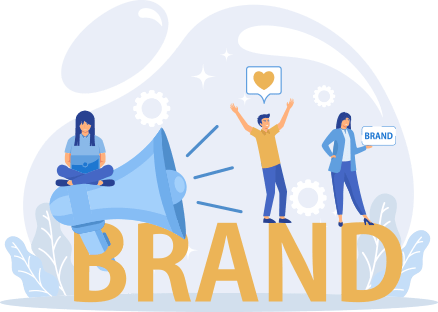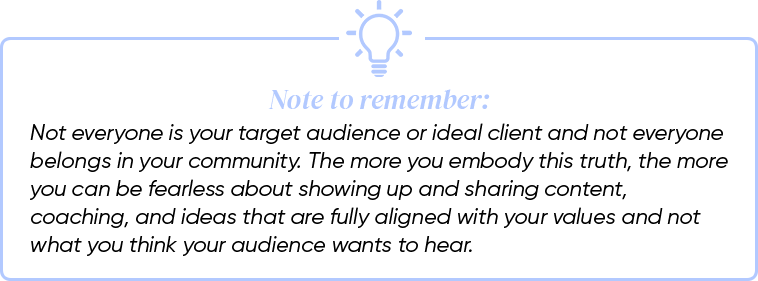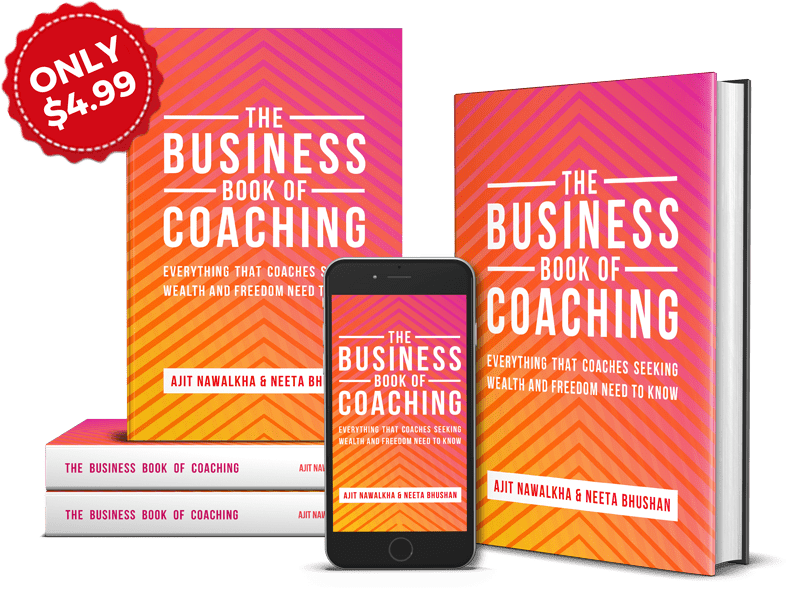The Ultimate Guide To Personal Branding

Featured Articles
When it’s done right, personal branding can take you from being a completely unknown coach to the heights of global recognition and, right now, personal branding for coaches is more important than ever.
According to global statistics, the coaching industry has been growing steadily over the past 5 years and the business coaching sector in the U.S. alone hit over $10 billion in revenue in 2019.
These are some mind-blowing numbers and it’s all great news except for one thing…
A fast-growing industry signals intense competition and what this means is that no matter where you are in your coaching journey -- whether you’re just starting out or you’ve been in the game for a while -- you need to know how to stand out and be seen in an increasingly crowded industry.
And this is why it becomes more important to build your coaching brand.
As a coach, you cannot shy away from personal branding. It is you, as a person, as a brand, who forms the backbone of your coaching business. Yes, you might be a person who shies away from the limelight, but your prospective clients will form opinions of you and your coaching based on the information that is available to them.
Therefore, it is crucial for you to present yourself as a brand that exudes the positivity and confidence of your coaching business.
Many people find the prospect of building a personal build quite overwhelming. However, if you follow a few simple actionable steps and arm yourself with the tips and knowledge, it will help you leverage your coaching skills and build an effective brand around you.
Renowned personalities such as Oprah, Richard Branson, and Tony Robbins all started small and scaled up their personal brands along with their skills as renowned coaches. While the goal might seem insurmountable, it is important to realize that small steps in the right direction will help you catapult your brand. This will in turn help you build a faithful repository of clients who will swear by you, not just as a brand but also as an effective coach.
Over the rest of this guide, you’ll learn exactly how to do that with a powerful personal brand that attracts your ideal audience and sets you up as a world-class coach.
We’re going to explore what personal branding is and how you can work on your coach branding consciously to help you dominate your area of expertise and exponentially grow your coaching business.
Sounds good? Let’s roll!
What Does Personal Branding Mean For Coaches?
“You never get a second chance to make a good first impression.”
You’ve probably heard that old saying and it’s more relevant and accurate now than ever before.
A great personal brand is essentially your chance to create a powerful, purposeful “first impression” on the world stage.
It works like a calling card.
It tells people who you are, what you do, and what you stand for as a coach – sometimes without you having to say a word!
At the highest level, a powerful personal brand is a sophisticated blend of your:
Personal branding can also include what you look like. For example, how you dress, walk, speak, your tone of voice, your energy, etc.
Personal branding for coaches is about how you show up and connect with clients channeled through pathways that have the potential to reach a massive audience such as your social media presence, your website, your videos, blog posts, and other digital and in-person content and appearances.
When you invest your time and energy into consciously cultivating a powerful personal brand, you can:
Establish your expertise in your chosen niche
Become an in-demand coach as more people get to know you
Build unbreakable trust with your clients and potential clients
Enjoy words of mouth marketing through referrals (a.k.a "free" advertising)
Receive invitations to be featured in podcasts, magazines, and online platforms
Build powerful partnerships with influential personalities and industry leaders
Quickly expand your audience and your client base
Be seen and accepted as an authority in your fields so you can easily charge what you're worth
These are just some of the benefits you can look forward to when you create a great personal brand, but they are virtually endless.
When you have a strong, authentic personal brand working for you day and night, you’ll see your income and impact grow at an exponential rate as you continue to build a solid reputation with audiences around the world.
Visualization Exercise
Based on what you know so far, how do you see a powerful personal brand creating a positive impact on your business and in your life? Close your eyes and visualize your answer. Take at least 5 minutes to do this. Then, grab a pen and piece of paper, and write down any ideas and insights that you received during the visualization exercise. Use these as the starting point to start crafting your personal brand.
The 4 Pillars Of A Powerful Personal Brand For Coaches

Draper is the lead character in Mad Men, a highly popular TV series that aired a few years ago. The show was all about the world of advertising in 1960s Madison Avenue, New York.
If you’re a fan of the series, you were probably drawn in by the gorgeous set decorations, compelling characters and storyline that revolved around the golden era of traditional advertising.
Don Draper is considered an authentic depiction of a real-world advertising “Madison Avenue Man” or “Mad Man.” His belief that “they’ll listen to anyone” reflects the heart of traditional advertising but the truth is things have changed…
A lot.
People have become more sophisticated in ways that the Mad Men of the 1960s could not have imagined. Today, customers and clients everywhere question everything -- they don’t listen to anyone anymore.
They only listen to people they trust. This is why taking the time to build a personal brand - and a really good one - is absolutely critical.
Personal branding works to attract clients only where there is deep trust and this is why TRUST is the key element you need to aim for.
Building trust with your personal brand comes down to these 4 foundational pillars:

Pillar #1: Authenticity
Being authentic and real is more important than just about anything else when it comes to communicating with your audience. And this shows in every conversation, interaction, and piece of content you can share with your audience whether it’s videos, blog posts, emails, or any other type of content.
Being authentic is about speaking from the heart and showing up as yourself.
It’s about sharing your ups and your downs, showing people that you are human, and allowing them to peek behind the scenes into your life and not just presenting your “best, Instagram-worthy self”.
Being real brings people into your world and lets them get to know you on a deeper, human level. This builds trust faster and more effectively than anything else.

Pillar #2: Reliability
You probably know someone who shows up on social media or email for a couple of weeks and then disappears for months before reappearing again. And then off and on again, and so on...
This is never a good idea when trying to build a brand and position yourself in the industry.
Being reliable is essentially about being consistent.
There are some coaches who are so inconsistent about their email marketing that their subscribers can’t even remember signing up for their email list in the first place. One random email later, they hit the "unsubscribe" button and they're gone. This is a huge mistake!
You simply cannot build trust with your audience if you don't practice consistency. A “hot and cold” approach will leave people feeling doubtful and most importantly – distrusting – of you and your integrity as a coach.
So, remember to go all in. You don't need to commit to a lot at once. Start small, focus on one strategy, but be consistent with it.

Pillar #3: Confidence
Confidence is a core driving force that builds deep trust in your personal brand.
A confident coach is someone who radiates certainty and this gives the audience a sense of knowing that you believe in what you teach and share.
Confidence doesn’t happen overnight and it’s definitely not something where you can go with the “fake it ‘till you make it” approach. You can cultivate authentic confidence by sharing your message and personal story that will communicate your values, your ideas, and your teachings to your audience in a way that lets them know you are who you say you are.
Confidence also arises through repetition and practice. Keep sharing your message, values, and story again and again, and you’ll find yourself becoming more confident and certain each time.

Pillar #4: Values-Driven
As a coach, choosing and living by strong values is possibly the most important thing you can do to build a powerful, trustworthy personal brand.
Values are basically the core principles of your life and work and your values could be anything from creativity and ambition to community and connection.
Values help you make decisions with alignment and integrity, and they let your audience know what you believe in and what you stand for as a coach through your content, offers, and how you show up in the world.
If you're not clear on what your values are, check out this in-depth article on how to identify your core values and beliefs, and use that to connect with your clients.
Craft the 4 pillars of your personal brand
Work through the following questions and activities for insights and ideas on how you can build deep trust with your audience with each of the 4 pillars.
Authenticity: Reflect on a personal or work-related failure you experienced in the last 3 to 5 years. What are some positive, personal traits that helped you overcome the failure? What did you learn from that experience? How did you grow?
Reliability: Think about a content creation timeline and plan out a schedule so you can show up regularly for your audience on social media, email, etc. Identify which platform(s) you want to focus on and your weekly cadence. Add the timeline to your calendar and promise yourself that you’ll stick to it until it becomes a long-term habit to consistently show up and share your content.
Confidence: Where do you feel you lack confidence in your work as a coach? Is it speaking onstage or on camera? Is it in sales or marketing? Is it in communicating your message? Is it during your actual coaching sessions with clients? After you’ve identified areas where you need a boost, look for training or programs that can help you gain more confidence.
Values-Driven: Choose 3 to 5 core values that you’d like to infuse into your personal brand. Give yourself time to choose values that feel aligned and congruent with who you are and what you’d like your personal brand to represent.
How To Craft A Powerful Personal Brand Story

You can create a great reputation where people are inspired to say something positive when you build trust with the pillars of authenticity, reliability, confidence, and values.
Another powerful and effective way to build your reputation is by sharing your story.
Here’s an example of a powerful personal brand story:
As a little girl growing up in Mississippi in the 1950s, there were not many opportunities for fame and fortune that were easily available for black girls and women. Most of them resigned themselves to becoming a cook or maid or dishwasher.
But this little girl was different.
She remembers watching her grandmother stirring boiled clothes in a big black cast-iron pot in the backyard and hanging them up to dry. As she worked, her grandmother called out to the little girl, “You better watch me now. You're going to have to do this someday.”

And the little girl thought to herself, “This will not be your life. Your life will be more than hanging clothes on the line"
That’s a deeply poignant personal story and, just in case you’re wondering, that little girl was Oprah Winfrey.
A well-crafted personal brand story inspires emotion. Powerful stories connect with the heart and they can draw in audiences in ways that data, numbers, and cold, hard strategy never will.
This is not to say that there’s no room for facts.
Wherever possible, it’s always a great idea to back up your skills as a coach with testimonials and a proven track record but keep in mind…
Facts without a story usually fall flat
A powerful personal brand story bridges the gap between you and your audience.
It gives them a chance to get to know you on a much deeper level and it’s an awesome way to build a lasting relationship based on trust, love, and loyalty.
The good news is you don’t have to be a great writer to craft an unforgettable personal brand story, you just need to work with a dependable writing method.
Evercoach co-founder Ajit Nawalkha uses a story framework that has been proven to work again and again for himself and for his clients and students.
Ajit’s framework is based on a simple trifecta of elements that are designed to bring forward the strengths and polarities in your character and in your storyline, so you’ll end up with an authentic, rich, multi-layered, and ultimately irresistible personal brand story.

Element #1: Building Your Character
Building your character is about reflecting on your personal strengths and weaknesses as well as your values, likes, and dislikes.
One good way to do this is to think of the milestone moments in your life – major wins and losses. Then, dig deep so you can uncover the insights, lessons, and character traits behind your failures and successes.
Building your character for your personal brand story also has to do with understanding your polarities.
Polarities are the extremes in your character that make you memorable and make you uniquely you. Nobody is 100% brave or 100% scared. We are all made up of multiple levels of positive and negative traits depending on where we are in life and the situation or challenge that happens to be in front of us.
If you’re feeling a little nervous about sharing the “negative” polarities in your character, know that the “negative” traits we feel we must hide are the very traits that make us human, relatable, and interesting. Your audience won’t connect with -- or likely even remember -- a one-dimensional coach who’s “perfect” (read: boring!) in every way.
Element #2: Identifying Your 3 Key Polarities
There are 3 key polarities you need to uncover and focus on in your personal brand story:
Superpower: This is your core strength or your superpower. It’s essentially something that’s highly positive.
Think of your superpower as a character trait or skill you want to highlight in your personal brand story. It needs to be something that you want people to know about that will inspire them to find out more about you and follow you.
For instance, if we think about a story-based character such as Tony Stark (aka Iron Man), one of his major positive traits or superpower is that he’s a genius.
Fatal Flaw: This is usually the other side of your superpower.
It’s a counter-intuitive polarity and sometimes it could even be the opposite of the superpower you identified earlier.
For instance, if you’re usually confident around meeting new people in social situations like at a party, your fatal flaw could be a sense of intense nervousness and insecurity when you’re speaking on stage. Going back to Tony Stark, it could be that his fatal flaw is arrogance or hubris.
North Star: This is basically your non-negotiable value or vision for the future. It’s something that you abide by and it’s something that you won’t compromise on.
Your North Star is usually tied to your ultimate goal.
For example, it might be about being honest with your clients no matter what or running your business with full integrity. For Tony Stark, his vision and non-negotiable value are protecting the world and keeping people safe at any cost.
Element #3: Finding Your Story
A lot of coaches resist writing their personal brand story because they think the act of storytelling is super complicated – a task that’s reserved for professional novelists and writers. This is simply not true.
The story of your life is unfolding even as you read this and when you break it down to the basics, a story is simply about sharing a series of events. Like all great stories, your personal brand story will follow a tried-and-tested story arc that’s sometimes called a “hero’s journey.”
A “hero’s journey” is when the key character or hero – in this case, you – is called toward a goal or vision. The hero starts out feeling lost, confused, or overwhelmed and then overcomes obstacles and challenges before finally achieving their goal or vision.
Here are a couple of expert tips to keep in mind before you start crafting your personal brand story…
Your story can be short and sweet or lengthy – a couple of paragraphs to a few pages long -- but we’re definitely not going for a novel-length epic story here.
Before you begin working with the framework in this chapter, start with an intention of cultivating a high level of self-awareness. When you’re self-aware of the positive and negative polarities in your character, you’ll see yourself accurately and you’ll be able to write a story that’s authentic, powerful, and unforgettable.
Create your personal brand story
Answer the following questions so you can uncover key highlights and jumpstart the process of crafting your very own story.
Element #1: Build Your Character
List out milestones that were game-changers in your life path and write about the takeaways and lessons learned from each of the milestones you listed.
Element #2: 3 Key Polarities
Superpowers: What are some of your top character traits? Pick 1 to 3 traits that you feel are the strongest.
Fatal Flaws: What are some of your more negative character traits or areas for improvement? Pick 1 to 3 traits that you feel are your strongest “fatal flaws.”
North Star: What is your vision for the future? What is an epic goal or dream that you have about how you want to live and how you want to change the world?
Element #3: Find Your Story
What was the trigger or triggers -- situation, person, place, or life experiences -- that inspired you to become a coach?
What was your life like before you became a coach? What was it like growing up? What did you struggle with? What was easy for you?
What are the biggest challenges and obstacles you’ve experienced since making the decision to become a coach?
What are some of the highlights and wins you’ve experienced since becoming a coach?
How do you want to make a positive difference in the world as a coach?
Six Steps To Build Your Personal Brand
A personal brand is in many ways similar to a corporate brand. It's about who you are, what you stand for, what your values are, and how you express those values. Just as a company's brand communicates its value to customers and differentiates it from its competitors, a personal brand does the same for individuals, giving potential employers and clients a unique identity.
Your story plays an important role in building and advancing your coaching career. Your personal brand should highlight your strengths, build your reputation, build credibility, and communicate the unique qualities you bring to your current (or desired) industry.
Developing a personal brand may sound daunting, but there are steps you can take to build credibility in your field.
Here are six steps for building a genuine personal brand and growing your coaching career along the way.
1. Find out who you are.
To build a personal brand that accurately reflects your personal and professional identity, you must first know who you are. Be introspective and make a list of your strengths and weaknesses. Ask yourself:
- What areas am I particularly good at?
- What motivates me?
- What qualities have others admired me for?
- What projects have others helped me with many times?
If you find it difficult to answer these questions, ask your friends, family, and colleagues how they would describe you.
Once you notice the different facets of your personality, you can decide how best to brand them.
Remember that many people struggle to choose a particular coaching niche because they don't want to limit themselves. Please be aware that it will change. The best strategy is to choose a specific area to focus on and let it evolve over time.
2. Decide what you want people to know.
Your personal brand reflects more than who you are today. It's a roadmap of where you dream to go. In addition to understanding your existing skills and competencies, evaluate your strengths and weaknesses in relation to the coaching industry.
In this way, you discover the skills and qualities that set you apart from others and the areas in which you need to improve or acquire new knowledge to move forward. If you can predict where you want to be in 5 or 10 years and what you want to be known for, you can better judge the steps you need to take to get there.
3. Research the coaching industry and follow the experts.
When starting to plan your desired coaching career, search for the best in the field.
Find the industry leaders in your coaching niche. Don't just follow them, do your research on their posting habits, the type of content they post, and the way they engage with their audience. Look for successful people and see what they do. See what they do, and what you can add on to make it uniquely yours.
The goal when building a personal brand is to differentiate yourself from them.
4. Prepare an elevator pitch.
Once you start conceptualizing your personal brand, take the time to create your elevator pitch. This is a 30-60 second story about who you are. Whether you're attending a networking event or an informal party, having an elevator pitch makes it easy to explain where you're going (or wanting to go) with your work and career.
Shorten the elevator pitch to focus on a few key points you want to emphasize.
5. Start Networking
While developing your ideal personal brand, it's important to network regularly (and effectively) to expand your professional circles. Connect with peers and industry thought leaders at formal and informal networking events.
The more connections you make and the more value you can provide, the more likely your personal brand will be recognized.
Don't be afraid to invite other attendees to an information session or casual coffee chat at these events. And if you don't get the chance to meet at an event, reach out via email or LinkedIn to keep the conversation moving.
6. Expand your online presence.
One of the most important aspects of personal branding is making sure your online presence resonates with your customers.
Use the ideas we built in the last chapter to develop your social media strategy.
Creating A Loyal Community For Your Personal Brand
“If a tree falls in the forest and nobody is around to hear it, does it make a sound?”
That is a philosophical thought experiment that questions the relationship between perceived reality and unperceived reality.

In other words, it asks if something is real only if someone is around to observe it or if it’s real whether there’s anyone around or not.
When it comes to personal branding, the answer to that question is clear -- if no one is around to connect with your personal brand, then it doesn’t really exist.
Think about it…
The greatest personal brand in the world is absolutely meaningless if no one is around to see, hear, and interact with what you share.
That’s why it’s incredibly important that you start to build a community and an audience who can relate to your brand, your message, and your values as a coach, right from the get-go.
Start building your community by identifying your target audience so you know you’re speaking to potential clients who want to connect with you, people who will benefit the most from your expertise as a coach.
The best way to do this is to create and share authentic content based on your personal brand values and vision.
This will attract people who have a similar vision and values as you do, and it’s a great way to build a growing tribe of clients who cannot wait to work with you and learn from you.
Three Simple Steps To Building Your Community
Finding the audience that would love your personal brand takes just three steps!
1. Attracting Your Dream Clients
First and foremost, you need to attract the people you want to do business with. Like any branding strategy, this requires good market research and acquisition planning. Create your ideal client's personality and create a detailed profile of who they are and why they need you. Once you've acquired your customers, create and deliver valuable content tailored to their needs and desires. Use this content to promote yourself as a great coach that can attract them and help them get to their goals faster. This will also help you narrow down things like the type of social media they frequent the most, their preferred content type, etc.
2. Supporters For The Win
Not everyone who admires your ideas or shares your content becomes a customer. Many of them become fans and supporters without really needing your services. It's a great way to build a reputation.
People who work in the same industry as you or have the same interests would be interested in reading your blog or trade publication guest articles. Share these with your online community of followers.
They also connect with you on social media. So join the channels they use most and make sure you're always posting and sharing great content.
3. Grow Your Audience
Now let's talk numbers. Once you've found the best fit in terms of tactics, channels, or content types, you can scale up your efforts to grow your audience.
Getting here requires a lot of experimentation and understanding of how to grow organically.
You should also think about how you can become more visible to audiences outside your immediate network as you continue to build your personal brand.
Stay alert for Public Relations or PR opportunities that will put you in front of other people’s audiences that are congruent with your identified target audience. Focused PR work can rapidly increase your visibility and you don’t need to hire an expensive PR professional, especially at the start because a lot of the groundwork can be done on your own.
For instance, think about emailing major podcast hosts or magazine and community-style websites who’ll be happy to publish or broadcast content from a skilled coach in a specific niche or area of expertise.
You can also try going down the traditional route. Reach out to non-virtual magazine writers and editors who are always looking for interesting, unusual, and inspiring stories, and expert insights they can share with their readers.

Selling Your Story on Social Media
Question #1: How much time does your ideal client spend on social media?
Question #2: What social media app do they use the most?
Question #3: What is the most preferred media type on this social media platform?For example, TikTok prefers short, thirty-second clips.
Question #4: How can you sell your personal story in their preferred media type? Draft at least three post ideas for the same.
Tools To Establish Your Personal Brand
Establishing your personal brand takes quite a bit of effort and commitment, but we’re here to make that easier for you.
Besides Evercoach’s excellent courses to help you get started with only your coaching career, including personal branding, there are also multiple free tools that you can use to build your personal brand effortlessly.
Let’s take a look at a few of our favorites.
1. Google Alerts

Want to monitor your personal brand mentions in search engines or your competitors?
Google Alerts is a free alerting service that allows you to monitor specific web search activity. This is great for tracking mentions of your name and business and can open up branding opportunities. With this tool, you can see where your competitors are mentioned and what platforms they use to build their online presence.
2. Google Trends
If you're having trouble finding content to publish for your blog or social media profile, Google Trends can help.
Google Trends is a tool for finding trending topics around the world. It can be used to find hot topics that fit your industry, so you can decide which approach to take.
This free service also lets you see if your target keyword is trending online. It provides information such as keyword volume and its performance history over the past months and years. Use these insights to make more informed strategies for your content and social media calendar.
3. Evernote
Evernote is great if you want to find content quickly and save it for later.
Evernote is an organizational tool that lets you store curated content you want to use in the future. The tool has a smart search feature that allows you to easily find your saved content. Don't worry about losing blog post drafts, images, or future content ideas.
Free organizer tools make it easy to curate content for your personal brand. Plus, thanks to its cloud-based service, you can take Evernote with you wherever you go
4. IFTTT
If you're looking for another automation tool that offers advanced features, IFFT is the app for you.
IFTTT or "If This, Then That" is a productivity tool that can connect apps, devices, or web services. It creates a series of conditional statements that perform specific actions.
For example, you can set your Twitter to automatically tweet whenever you post on Instagram. The logic goes like this: "If this (Instagram) posts a new image, this (Twitter) tweets the same image," saving time on manual administrative tasks.
5. Canva

Do you want to create images that grab your audience's attention? Canva offers dozens of design templates and layouts for all your branding needs.
Canva is a design platform that allows you to create a variety of graphics for your personal brand. Yes, you can create images for social media posts, website banners, presentations, book covers, and even logos and videos without any artistic skills.
Design images unique to your brand using drag-and-drop functionality and a vast library of graphic elements. For those who want to create professional graphics without a designer, this is a lifesaver.
6. Answer The Public

Content marketing is your personal brand's best friend. Creating consistently high-quality content with your audience in mind is a great way to build trust. But before creating and sharing content, you need to know exactly what topic you want to write about. This is where Answer the Public comes into play.
This free tool takes keywords and automatically generates a report on phrases and questions that are currently trending on search engines. With that data in hand, you can start creating highly relevant, timely content that shows up in candidate searches on the spot.
7. Wisestamp

To build a strong personal brand, everything must be consistently branded, right down to your email signature. Wisestamp is a free email signature generator that lets you create professional and informative signatures in just a few clicks.
Their easy-to-use template tool lets you add relevant links and social media icons. Sign off your emails in style!
How To Grow Your Coaching Business
Here's How To Have A Fully Booked Practice, Consistently Grow Your Income And Impact Thousands Of Lives...
...Even If You Know Nothing About Marketing Or Sales.

